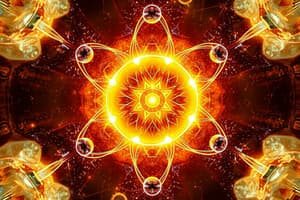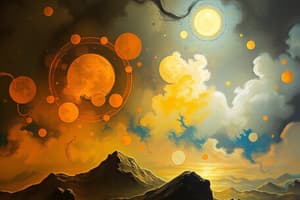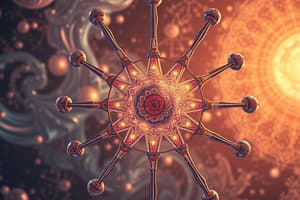Podcast
Questions and Answers
What is the atomic number?
What is the atomic number?
- The number of protons in a nucleus
- Both B and C (correct)
- The number of electrons in a neutral atom
- The number of neutrons in a nucleus
What are isotopes?
What are isotopes?
Atoms of a single element that differ in the number of neutrons in their nuclei.
What is protium?
What is protium?
Hydrogen-1, the most common hydrogen isotope.
What is deuterium?
What is deuterium?
What is tritium?
What is tritium?
What are elements?
What are elements?
What is an atom?
What is an atom?
What is a proton?
What is a proton?
What is an electron?
What is an electron?
What is a neutron?
What is a neutron?
What is average atomic mass?
What is average atomic mass?
What is an atomic mass unit?
What is an atomic mass unit?
What is Avogadro's number?
What is Avogadro's number?
What is a mole?
What is a mole?
Flashcards are hidden until you start studying
Study Notes
Atomic Structure Fundamentals
- Atomic Number: Represents the number of protons in the nucleus and equals the number of electrons in a neutral atom.
- Isotopes: Variants of a single element that possess the same atomic number but have different numbers of neutrons, resulting in different masses.
Hydrogen Isotopes
- Protium: The most prevalent isotope of hydrogen, designated as Hydrogen-1.
- Deuterium: Also known as Hydrogen-2, contains one neutron in its nucleus, distinguishing it from Protium.
- Tritium: Known as Hydrogen-3, features two neutrons in its nucleus.
Basic Atomic Concepts
- Elements: Composed of atoms that are all of the same type, defining the chemical properties of the matter.
- Atoms: The fundamental building blocks of elements, incredibly small, with about one million atoms fitting across a hair's width.
Subatomic Particles
- Proton: A positively charged particle located in the nucleus, its number corresponds to the atomic number, with a mass of one atomic mass unit (amu).
- Electron: A negatively charged particle that orbits the nucleus, contributing to an atom's charge balance.
- Neutron: A neutral particle found in the nucleus. Neutrons can vary among isotopes while still identifying as the same element.
Measurement and Constants in Chemistry
- Average Atomic Mass: The weighted average of the atomic masses of an element's naturally occurring isotopes, commonly found in the periodic table beneath the element symbol.
- Atomic Mass Unit (amu): A standard unit for measuring atomic mass, equivalent to approximately 1.660540 x 10^-27 kg.
- Avogadro's Number: A fundamental constant in chemistry representing the quantity 6.02214076 x 10^23, which quantifies the number of particles in one mole.
- Mole: The amount of substance that contains exactly Avogadro's number of specified entities, typically atoms or molecules.
Studying That Suits You
Use AI to generate personalized quizzes and flashcards to suit your learning preferences.




